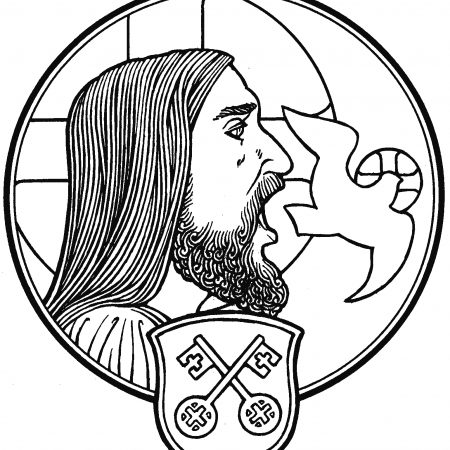The Seventh Sunday of Easter
John 15:26–16:4
+ IN NOMINE IESU +
“Indeed, the hour is coming when whoever kills you will think he is offering service to God.” This was our Lord’s promise to His disciples as He was about to depart this world to return to His Father. He told them these things to keep them from falling away. To prepare them for what was about to come, so that when it did come, they would remember His Word. And remember they did. For they all were killed, save one. All of them, except John the Evangelist, gave their lives to bear witness to what they heard and what they saw. They were His witnesses. They were with Him from the beginning. They bore witness to the truth, They were martyrs of the Gospel of our Lord Jesus Christ. They testified before the world, and their testimony was this: Jesus who was crucified under Pontius Pilate was raised from the dead on the third day and is now ascended into heaven, seated at the right hand of God the Father. Death is dead. Life lives. Our sins are atoned for. We are free from sin, death, and the power of the devil, and they have no claim on us. We are reconciled to God the Father as His own beloved children because of His Son’s perfect sacrifice.
And for this truth they gave their lives. For this they were put to death. They spilt their blood rather than fall away. And those who spilt their blood—those who crucified Peter and Andrew, those who flayed Bartholomew alive and who roasted Lawrence on the grid iron—they did so thinking they were offering service to God. What they meant for evil; God used for good. For the blood of the martyrs is the seed of the church. Yet, this in no way excuses or justifies their rage or their deeds. For “the road to hell is paved with good intentions” (Bernard of Clairvaux).
Good intentions are the fruitful mother of our sins. It was good intentions that, in the beginning, deceived Eve when, seeing “that the tree was good for food, and that it was a delight to the eyes, and that the tree was to be desired to make one wise, she took of its fruit and ate,” making them transgressors of God’s Word (Gen 3:6). It was good intentions that led Moses to take the life of an Egyptian, thus breaking the commandment of the Lord. It was good intentions that inspired the son’s of Aaron to offer unauthorized fire in the Tabernacle, not heeding the Lord’s instructions. It was good intentions that seized Peter so as to prevent the Lord from His cross, making him the mouthpiece of Satan. And it was good intentions that led Pilate, in the vain hope of squelching rebellion, to crucify the Son of God. Indeed, they thought they were offering service to God. But the road to hell is paved with good intentions.
And what about us? We can rationalize almost any sin if we can find a good intention for it. Good intentions are the snares “Satan uses to trap souls, keep them deceived, and draw them ever deeper into sin” and other great shame and vice (Walther, Gospel Sermons, Vol I, 286). We think that our sins are harmless and safe. But it never works that way. Our sins hurt those we love. We place our very souls in peril and our good intentions don’t really matter. We are vain to think we can get away with it. Beware, dear friends in Christ. This is death. “The intention of man’s heart is evil from his youth,” says Moses (Gen 8:21). “Whoever trusts in his own mind,” Solomon writes, “is a fool” (Prov 28:26). Saul had good intentions when Samuel was delayed and he offered a sacrifice. God said to him, “To obey is better than sacrifice . . . . Because you have rejected the Word of the Lord, He has also rejected you from being king” (1 Sam 12:22–23; Walther, Gospel Sermons, Vol I, 291). Even as Paul had good intentions in standing idly by to watch the stoning of Stephen. But there was no excuse. And in excusing their sins with good intentions, they reject the very thing that saves them from them. For Christ says, “they do these things because they have not known the Father, nor Me.”
Our sins are dangerous. We are weak in resisting them. Left to ourselves, we would not only be damned but we would also destroy all that is good. Thus, Jesus has said all these things to keep you from falling away, so that when that hour comes you would remember that He told you. So, He sends the Helper from the Father. He has more than good intentions. He has the Father’s own mission: to save and rescue the world by bearing witness to the Son’s perfect love and sacrifice. He is strong to save. He routs the enemy by stretching Jesus out on the cross to absorb all the attacks of Hell and all of Satan’s accusations. He calls us by the Gospel, enlightens us with His gifts, sanctifies, and keeps us by grace as His children. He does what we could never do, what we could never expect. He proclaims the pierced hands and side of Him who was crucified and now lives. He speaks peace and reconciliation. He declares the forgiveness of sins, life, and salvation to all who repent and believe. He announces that death is dead and that life lives. And He makes us who were no people to be God’s own people, His beloved children in whom He is well pleased by water and word. He feeds and strengthens us for our journey to our heavenly home with the body and blood of Him who died but lives. Jesus lives. The Helper is here. The Father loves you. For you are His people, and He is not ashamed to be called your God. Amen.



0 Comments